Drew Myron's Blog, page 15
November 29, 2021
Who Are You?

Six Word Memoir by Drew Myron
Can you tell your life story in six words?
Six Word Memoirs are the potato chips of poetry. You don't think you're hungry so you eat just one, but the salt is so delicious you just can't stop. Go on, make a mess, eat the whole bag.
No really, give it a go. Once you write one, you’ll find yourself thinking of everything in six-word summations.
Six Word Memoirs were introduced in 2006 by Larry Smith, a writer and editor who went on to create a massive series of bestselling Six-Word Memoirs.
I love this form! Years ago, the first six words I wrote turned out to be the theme of this blog (and my life):
Push words, pull light, carry balm.
Recently, my writing group — a hardworking and hardwriting collection of writers from all over the map (literally and literarily) who ‘meet’ weekly by email — played with six word arrangements. The gems they created are simple, striking, surprising . . . and fun to write & read.
Here, with permission, are a few:
Loving, being loved.
Work.
Books.
Noticing.
— Vicki Hellmer
tried to become
someone I'd miss
Triptych
1)
hide, seek,
lost, found,
repeat, repeat
2)
moon song,
swoon song,
swan song
3)
ruby slippers for sale,
well-worn
— Audrey Mlakar
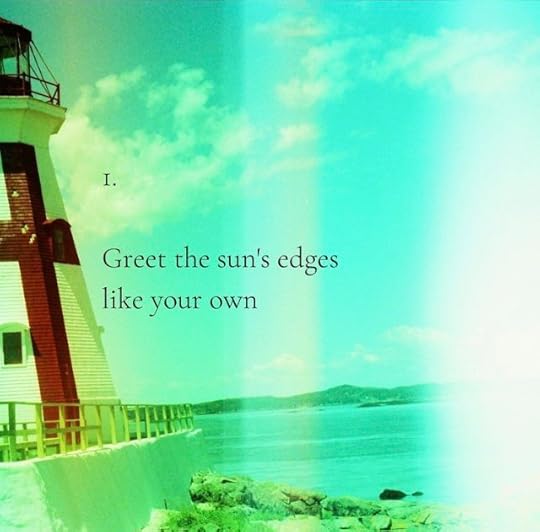
Four Attempts by Sarah Cook
Sarah Cook enlarged the idea to create four linked nuggets, combined with her photos. See the series on Instagram @ freelance.feminist
Your Turn: Write a Six Word Memoir (or two, or ten . . . ). And if you’re feeling communal, share with me.
Write on!
* * *
If you like this blog, subscribe here to get it delivered directly to your email. And please share with a friend.
The world turns on words, please read & write.
November 18, 2021
Thankful Thursday: Gather Gladness
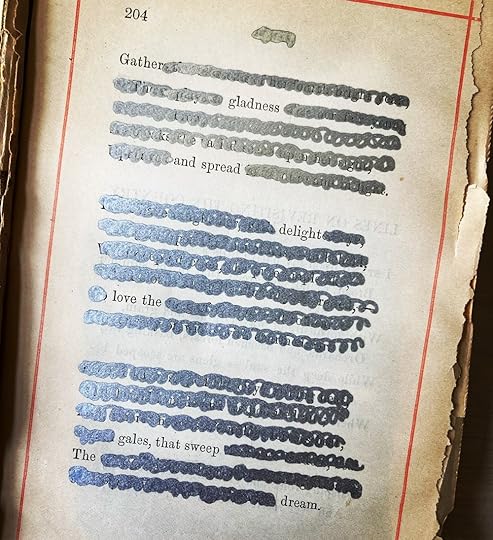
I can’t stop scribbling these pages.
On this Thankful Thursday, I’m thankful for worn old books.
Day after day, these thin yellowed pages call me awake. The erasure poem — or in my case, one or two ‘found’ lines — is just the low-stakes, high-yield sense of accomplishment I need right now. When my thoughts are dull and mind is stalled, finding an unexpected nugget is a small and lovely yes.
Do you know Mary Ruefle, master of wry and beautiful erasure poems? She spends every morning in old books erasing text. She’s made over 100 books and her mind works in mysterious, wonderful ways. I’m thankful for her, too.
It’s the season of gratitude (and platitude). I work hard to avoid the sappy praise of rainbows and kittens. But some days there is a rainbow, and I feel the jolting swerve of gratitude, platitude, joy. And really, I’m grateful for the swerve.
Gather gladness
and spread delight.
Love the gales that
sweep the dream.
Joy expands and contracts in direct relation to our sense of gratitude. What are you thankful for today? A person, a place, a thing? A story, a song, a poem? What makes your world, your heart, expand?
* * *
If you like this blog, subscribe here to get it delivered directly to your email. And please share with a friend.
The world turns on words, please read & write.
November 14, 2021
On Sunday: Tumult
The Tumult
In this fever
we wonder
what
links
us.
tu·mult | \ ˈtü-ˌməlt
noun
1 : noise and excitement, or a state of confusion, change, or uncertainty
There’s so much noise now.
Even in the quiet spaces, especially in the quiet places.
In mind and heart, I feel the tumult of the times. I’m trying to turn down the volume, turn up the good, trying to make something in the rumble. For now, I’m erasing to find my way.
* * *
The world turns on words, please read & write.
If you like this blog, subscribe here to get it delivered directly to your email. And please share or forward to a friend.
November 7, 2021
On Sunday: Autumn Rain
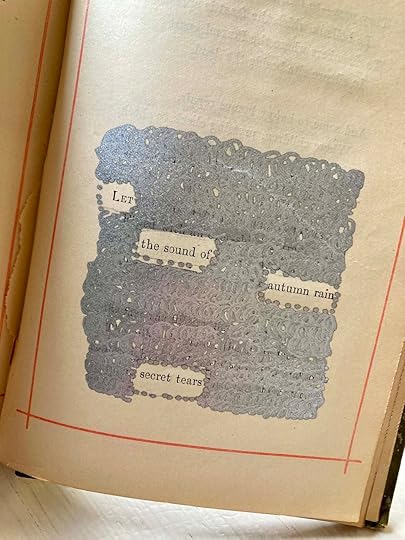
Rain, rain, and rain.
It’s a good day for old books. For small thoughts. For space to fill the gaps, for words to fill the space. For erasing one thing to make room for anything. For making meaning from absence. For marking your days, your page, your life.
Join me, please. Make something.
Let
the sound
of autumn
rain secret
tears.
— Drew Myron
* * *
If you like this blog, please subscribe here to get it delivered directly to your email. And please share or forward to a friend. The world turns on words, please read & write.
October 28, 2021
Thankful Thursday: Hold the Light

It’s Thankful Thursday, a weekly pause to express appreciation. Remember that?
Ummm, yeah, it’s been awhile. Life is hard, still, again. I’m trudging. Are you, too?
“I’m trying to look on the bright side,” a friend tells me, “but everything is so heavy.”
Another friend feels constantly tired. It’s not about sleep. It’s the mental and emotional energy required to just keep on.
Joy expands and contracts in direct relation to our sense of gratitude — especially in the heavy days. On this Thankful Thursday, I’m reaching for the light, trying to make the small things shine (without feeling like an annoying "life coach”).
I found a gem at the library today. Just when I think I’ve read every William Stafford poem available, I walk into the library, turn to a shelf and find a poem that speaks to the walk I just made from here to there. My head had been full of longing and my steps slow with a vague rootlessness. I scuffed through wet leaves papering the street, thinking how brilliant this last step to decay. But I also thought, with a clarity only autumn’s letting go can bring, that the end is rarely so pretty. This golden brilliance of trees, this crunch beneath my feet, I know death’s slow ugly ebb and this is not it.
But of course it is, in its way.
And then I found a worn slim book, Braided Apart, and turned randomly to this poem. And then, because the poem felt like an ushering in, I wrote it out. Copied by hand, again and again, until I could feel the words, the pace, the core. Until a poem made me feel more clear, more light, more me.
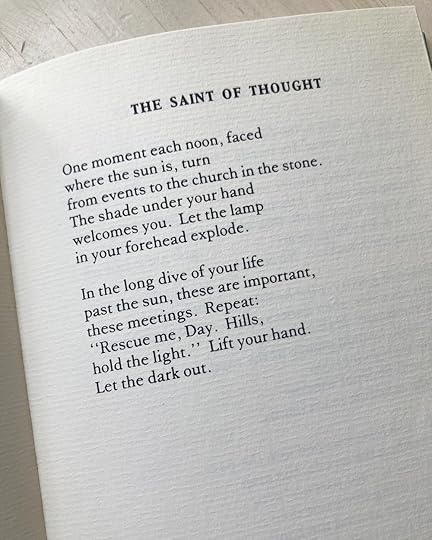
The Saint of Thought by William Stafford, from Braided Apart by Kim & William Stafford.
What are you thankful for today? From the puny to profound, what makes your world, your heart, expand?
* * *
If you like this blog, subscribe here to get it delivered directly to your email. And please share on your social network of choice or forward to a friend.
The world turns on words, please read & write.
October 12, 2021
The landscape in you

1.
Where are you?
Not place, but yes, place. I mean: within you, where are you? No need to respond. No obligation to wonder, to wander.
But, please, do try.
2.
I thought the ocean would redeem me. Sprawled flat-back against warm September sand, palms open and lifted, I once declared a new start.
But winter came and came and came and flattened me into something less. Granular. Between wave, wind, and saturating storm, the dull pressure of gray soaked and rearranged. Through rain and tears, I curled into my self.
I traveled for miles, for years, then stumbled back where I began, on dry land where suede hills roll across a landscape scraggled and wide. Canyon, mountain, meadow and swale, in all directions the earth does not erode or ebb, does not shift or sink, does not wear me away.
Here, the horizon is an unbroken line of nothing. This is the long gestation, a slow appreciation for absence. When you think there is nothing, the smallest life blooms. Sage in spring, bunchgrass summers, rabbitbrush in fall, and winters of scrubby strays that tumble through lonely stretches.
A single meadowlark calls, another answers from far away. Everything here is away, and yet this distance draws you near. Just as silence fills a noisy gap, absence is a virtue. The something of nothing. I hunger for it now, these vast saddle soft edges, a place to put my quiet.
3.
If only we could keep going, out of harm's way, writes Robert Vivian in Hereafter in Fields, and take with us only the best parts of ourselves.
4.
There are hundreds of routes to the same place. Sometimes I imagine how this geography can make me better, or that one kinder. Sometimes gauzy appreciation is truth steeped in love. Mostly, though, it's hope for better around the bend, a few more miles, the very next stop.
5.
Why do I need these landscapes, Anna Kamienska asks. The roots of my astonishment at the world cling tight to my inner life, in a tangle of memories, experiences.
6.
I have learned this land slowly, mulling as I usually do. Resistant then relenting, hiking through gravel and shale, basalt ridges and sun-bleached plateau, doubting the way, doubling back. This is the shape of my days, which is to say, my life.
In this terrain, a tether is tendered. It's a filament so slight that trust must fill what the hand can't grip, what the heart is desperate to hold.
7.
But sometimes, says John Ashberry, standing still is also life.
* * *
If you like this blog, subscribe here to get it delivered directly to your email. And please share on your social network of choice or forward to a friend.
The world turns on words, please read & write.
September 22, 2021
Back to School: Writing Books
In this September glow I get that back-to-school feeling that makes me want to grow.
I’m hungry to write and stretch. And I’m reaching for my favorite books, those dog-eared, post-it noted classics that always get me revved up & writing.
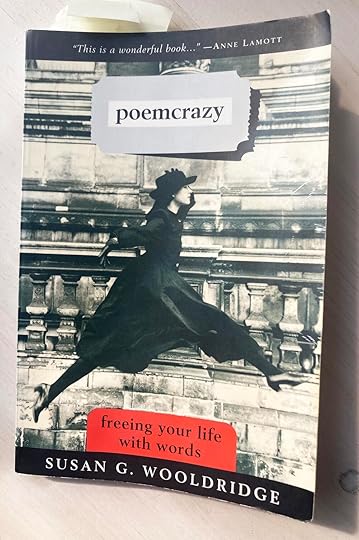
Poemcrazy: Freeing Your Life With Words
by Susan Wooldridge
Full of joy and encouragement, this lovable book reminds me that good writing is rooted in fun.
“It’s impossible to teach anyone to write a poem. But we can set up circumstances in which poems are likely to happen. We can create a field in and around us that’s fertile territory for poem. Playing with words, we can get to the place where poems come from.”

The Writer’s Portable Mentor
by Priscilla Long
I’ve had this book for 10 years and still haven’t reached the end. It’s a dense manual for advanced writers dedicated to improving their craft. While geared primarily to fiction writers, I’m a firm believer that exercising the writing muscle is a good workout for writers of all forms. This book’s guidance is valuable across genres, and I enjoy dipping in and out.
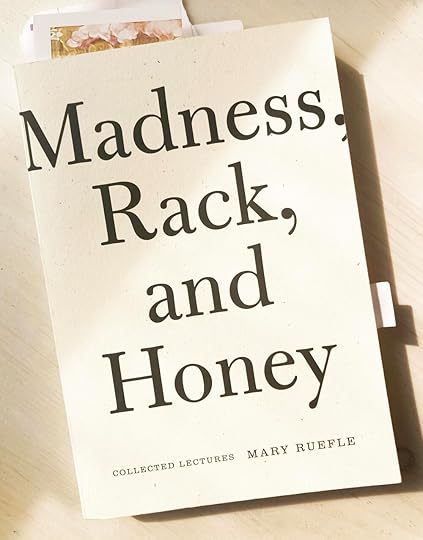
Madness, Rack, and Honey: Collected Lectures
by Mary Ruefle
Wise and wry, Mary Ruefle is poet, guide, and smart-sharp professor in the din of a cocktail party lobbing sly observations:
“There is a world that poets cannot seem to enter. It is the world everyone else lives in. And the only thing poets seem to have in common is their yearning to enter this world.”
and this:
“The greatest lesson in writing I ever had was given to me in an art class. The drawing instructor took a sheet of paper and held up a pencil. She very lightly put the pencil on the piece of paper and applied a little pressure; by bringing her hand a little in one direction, she left a mark upon the paper. ‘That’s all there is to it,’ she said, ‘but it’s a miracle. Once there was nothing, and now there’s a mark.’ ”
Tell me: What gets you revved up to write?
If you like this blog, subscribe here to get it delivered directly to your email. And please share on your social network of choice or forward to a friend.
The world turns on words, please read, write & share.
September 7, 2021
Dear,

1.
It took just one letter to hook me on a lifelong appreciation of correspondence.
At six years old, I wrote my first letter. My grandparents had given a gift and my mother insisted I write a thank you note. Her method was simple: I told her what I wanted to write, she wrote the words, then I copied her words to compose my own letter.
With each letter received, I eagerly wrote back. Back and forth. Soon, I was writing on my own. For over 30 years, my grandma and I exchanged letters.
Do other mothers do this? It seems a brilliant way to bring personal expression to life, while also instilling a love of writing. Decades letter, writing and receiving letters is among my favorite things (thanks Mom).
2.
Letter
Today I did almost nothing.
Read a little, tried to write a sentence
to make another sentence seem necessary.
I wasn't unhappy. Everything
I could will myself to do I'd done,
so I said I'd done enough.
Now I'm looking out my window:
white pine, ash, a single birch,
the leanings and crossings
of branches. And then the sky:
pale, undecided. Years ago
you wrote to me about a matter
that worried you, and you said
at the end, "That's probably the best,
and most true, way to think about it."
I kept your sentence in my notebook.
I liked its shape. I admired the way,
young as you were, you could feel
one kind of thinking
adjusting into another, one truth
becoming a better truth.
Now you're far off, and alone, and I
have no advice you haven't already
given yourself. What can I tell you?
That I'm here? That today, when I saw
how tenderly the light was moving
among those trees, I thought of you?
—Lawrence Raab
3.
Does anyone write letters anymore?
I get a few, on occasion. I savor the delivery. How a letter arrives unexpectedly, with a messy scrawl or loopy letters. How a hand on paper can make a mark on the heart, even before the envelope is broken. How the greeting sets a tone, ushers me in or holds me back.
“To say what letters contain is impossible,” writes Anne Carson in The Beauty of the Husband. “In a letter both reader and writer discover an ideal image of themselves, short blinding passages are all it takes.”
I have written letters laying bare all I am or am not, all I wish to be. And I have felt an exhilarated exhaustion.
4.
In a letter we are hungry for connection, for compassion. Are you, too, restless, reaching for a clarity, seeking to both know another and understand yourself? And really, is it not the same quest?
5.
“We’re all lonely for something we don’t know we’re lonely for,” said David Foster Wallace in This Is Water, a commencement speech. “How else to explain the curious feeling that goes around feeling like missing somebody we’ve never even met?”
Yes, yes, more than just a form of communication, a letter is bridge.
A letter is a call across miles, a plea for presence.
6.
Elegy for the Personal Letter
I miss the rumpled corners of correspondence,
the ink blots and crossouts that show
someone lives on the other end, a person
whose hands make errors, leave traces.
I miss fine stationary, its raised elegant
lettering prominent on creamy shades of ivory
or pearl grey. I even miss hasty notes
dashed off on notebook paper, edges
ragged as their scribbled messages—
can't much write now—thinking of you.
When letters come now, they are formatted
by some distant computer, addressed
to Occupant or To the family living at—
meager greetings at best,
salutations made by committee.
Among the glossy catalogs
and one time only offers
the bills and invoices,
letters arrive so rarely now that I drop
all other mail to the floor when
an envelope arrives and the handwriting
is actual handwriting, the return address
somewhere I can locate on any map.
So seldom is it that letters come
That I stop everything else
to identify the scrawl that has come this far—
the twist and the whirl of the letters,
the loops of the numerals. I open
those envelopes first, forgetting
the claim of any other mail,
hoping for news I could not read
in any other way but this.
7.
Today a six-year old writes me a letter, full of loops and curves, butterflies and hearts. Did her mother help her form the words, sound out each spelling? Did she labor and love? In the receiving, I am both excited child and calm adult, both writer and reader. I am hopeful and heartened.
A few words on paper, that’s all it takes.
August 31, 2021
Thankful Thursday (on Tuesday): You
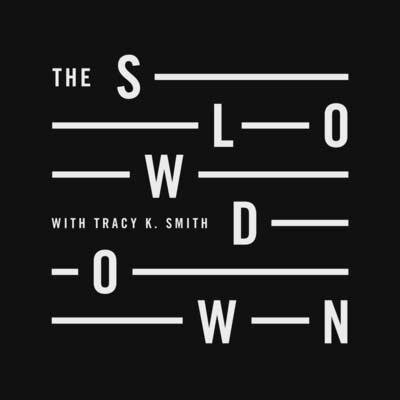
Sometimes you have to hear it.
The way words shine with sound. The way a poem calls you in, holds you close, moves and shapes before letting you go.
Hearing this poem changed my day (and maybe me).
Listen here.
(No, really, it’s worth the effort).
You Are Who I Love
by Aracelis Girmay
You, selling roses out of a silver grocery cart
You, in the park, feeding the pigeons
You cheering for the bees
You with cats in your voice in the morning, feeding cats
You protecting the river You are who I love
delivering babies, nursing the sick
You with henna on your feet and a gold star in your nose
You taking your medicine, reading the magazines
You looking into the faces of young people as they pass, smiling and saying, Alright! which, they know it, means I see you, Family. I love you. Keep on.
You dancing in the kitchen, on the sidewalk, in the subway waiting for the train because Stevie Wonder, Héctor Lavoe, La Lupe
You stirring the pot of beans, you, washing your father’s feet
You are who I love, you
reciting Darwish, then June
Feeding your heart, teaching your parents how to do The Dougie, counting to 10, reading your patients’ charts
You are who I love, changing policies, standing in line for water, stocking the food pantries, making a meal
You are who I love, writing letters, calling the senators, you who, with the seconds of your body (with your time here), arrive on buses, on trains, in cars, by foot to stand in the January streets against the cool and brutal offices, saying: YOUR CRUELTY DOES NOT SPEAK FOR ME
You are who I love, you struggling to see
You struggling to love or find a question
You better than me, you kinder and so blistering with anger, you are who I love, standing in the wind, salvaging the umbrellas, graduating from school, wearing holes in your shoes
You are who I love
weeping or touching the faces of the weeping
You, Violeta Parra, grateful for the alphabet, for sound, singing toward us in the dream
You carrying your brother home
You noticing the butterflies
Sharing your water, sharing your potatoes and greens
You who did and did not survive
You who cleaned the kitchens
You who built the railroad tracks and roads
You who replanted the trees, listening to the work of squirrels and birds, you are who I love
You whose blood was taken, whose hands and lives were taken, with or without your saying
Yes, I mean to give. You are who I love.
You who the borders crossed
You whose fires
You decent with rage, so in love with the earth
You writing poems alongside children
You cactus, water, sparrow, crow You, my elder
You are who I love,
summoning the courage, making the cobbler,
getting the blood drawn, sharing the difficult news, you always planting the marigolds, learning to walk wherever you are, learning to read wherever you are, you baking the bread, you come to me in dreams, you kissing the faces of your dead wherever you are, speaking to your children in your mother’s languages, tootsing the birds
You are who I love, behind the library desk, leaving who might kill you, crying with the love songs, polishing your shoes, lighting the candles, getting through the first day despite the whisperers sniping fail fail fail
You are who I love, you who beat and did not beat the odds, you who knows that any good thing you have is the result of someone else’s sacrifice, work, you who fights for reparations
You are who I love, you who stands at the courthouse with the sign that reads NO JUSTICE, NO PEACE
You are who I love, singing Leonard Cohen to the snow, you with glitter on your face, wearing a kilt and violet lipstick
You are who I love, sighing in your sleep
You, playing drums in the procession, you feeding the chickens and humming as you hem the skirt, you sharpening the pencil, you writing the poem about the loneliness of the astronaut
You wanting to listen, you trying to be so still
You are who I love, mothering the dogs, standing with horses
You in brightness and in darkness, throwing your head back as you laugh, kissing your hand
You carrying the berbere from the mill, and the jug of oil pressed from the olives of the trees you belong to
You studying stars, you are who I love
braiding your child’s hair
You are who I love, crossing the desert and trying to cross the desert
You are who I love, working the shifts to buy books, rice, tomatoes,
bathing your children as you listen to the lecture, heating the kitchen with the oven, up early, up late
You are who I love, learning English, learning Spanish, drawing flowers on your hand with a ballpoint pen, taking the bus home
You are who I love, speaking plainly about your pain, sucking your teeth at the airport terminal television every time the politicians say something that offends your sense of decency, of thought, which is often
You are who I love, throwing your hands up in agony or disbelief, shaking your head, arguing back, out loud or inside of yourself, holding close your incredulity which, yes, too, I love I love
your working heart, how each of its gestures, tiny or big, stand beside my own agony, building a forest there
How “Fuck you” becomes a love song
You are who I love, carrying the signs, packing the lunches, with the rain on your face
You at the edges and shores, in the rooms of quiet, in the rooms of shouting, in the airport terminal, at the bus depot saying “No!” and each of us looking out from the gorgeous unlikelihood of our lives at all, finding ourselves here, witnesses to each other’s tenderness, which, this moment, is fury, is rage, which, this moment, is another way of saying: You are who I love You are who I love You and you and you are who
* This poem appeared on The Slow Down, offering audio poems read by Tracy K. Smith, who served as U.S. Poet Laureate, 2017 - 2019. Sadly, this thoughtful poetry podcast no longer runs.
It’s Thankful Thursday (on Tuesday, because gratitude holds no schedule), a weekly pause to express appreciation for people, places, things and more.
On this Thankful Thursday, I am grateful for this poem, this poet, and the podcast that lifted the words off the page and into my heart.
What are you thankful for today?
August 22, 2021
On Sunday: In pain, rage and ravages

The angel lives in pain, an erasure collage by Drew Myron
The angel lives in
pain, rage
and ravages
and by choosing
hope and humanity
we emerge from
crisis.
The world turns on creative expression. Please read, write & make.
If you like this blog, subscribe here to get it delivered directly to your email. And please share on your social network of choice or forward to a friend.



